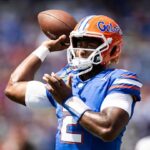Sad News: How FSU Became FIU, Travis Hunter’s NFL Fate Revealed, and a Big Red Bombshell
1. I don’t want to get on a soapbox, but …
There’s no denying it now. In a matter of months, FSU has become FIU.
From national championship contender in 2023, to becoming the third FBS team in 45 years to lose twice as a double-digit favorite to start the season.
From whining about playoff worthiness to humbling back-to-back losses to ACC welterweights Georgia Tech and Boston College.
From the blueprint to navigating the new world of NIL and free player movement in the transfer portal, to what in the wide world of sports is going on here?
We’ve been knocked down,” Florida State coach Mike Norvell said after the latest gut punch Labor Day night from Boston College. “We know how to get back up.”
They shouldn’t be in this position in the first place. The genesis of this colossal collapse at the worst possible time (more on that later), is the decision Norvell made in late December of 2023.
He decided to offer a scholarship — and therefore, the starting job — to nomadic quarterback DJ Uiagalelei. Full of momentum and winner of 19 consecutive regular-season games, Norvell took his white-hot program and threw a heavy, wet blanket on it.
He could have signed Cam Ward. He could have signed Will Rogers or KJ Jefferson or anyone who hadn’t proven to be just another guy at two previous stops (Clemson, Oregon State).
Don’t blame DJU for this mess. Norvell and his staff share in it, too.
You win because of former FSU star Jordan Travis, you win with Uiagalelei. At least, that was the idea.
MORE:Florida State coach Mike Norvell addresses ‘failure’ of stunning 0-2 start
For the next eight months, Norvell spoke about DJU’s work ethic and leadership, and FSU’s ability to surround him with players to help him and the team reach lofty goals. Then the season began, and what had played out the previous four seasons for DJU showed up again.
In two games, Uiagalelei has missed three touchdown throws, all three throws that quarterbacks at this level of college football have to make. His accuracy is shaky, and the offense — like Clemson and Oregon State prior — plays with a lack of urgency.
You’re not winning games when your quarterback is completing 58% of his passes and averaging less than 7 yards per attempt. But it’s not all DJU. We should’ve seen this coming from last season, when bowl game opt-outs left FSU with its current roster minus transfer portal signings — and it lost by 60 to Georgia in the Orange Bowl.
So the idea was to supplement the Orange Bowl team through the portal, and then give DJU the keys to the machine. The problem: Keon Coleman, Jared Verse, Braden Fiske, Tatum Bethune, et al, aren’t walking through that door year after year after year.
Nor was Travis (also a portal addition), whose elite play at the most important position on the field erased so many mistakes on both sides of the ball.
Everything that once worked with the influx of transfer portal additions now looks like a discombobulate mess. The Seminoles can’t run the ball, they can’t stop the run.
They’ve left everything in the lap of DJU, who has proven over and over that he’s not a quarterback you win because of.
Now he’s not a quarterback the Noles can win with, either.
A seminal, Big Red moment
This is why Dylan Raiola signed with Nebraska. Why the five-star quarterback recruit bailed on a commitment to Georgia and decided to redefine a program — instead of being just another cog in the machine.
A week after a warmup win over Texas-El Paso, it gets real for the legacy recruit this week against bitter rival Colorado.
Raiola looked poised and confident against UTEP, threw for 238 yards and two touchdowns, and most importantly — considering the recent history of Nebraska quarterbacks — didn’t throw an interception or lose a fumble.
Of all the turnover problems at the position over the Scott Frost era, and into Year 1 under Huskers coach Matt Rhule, none underscored the enormity of the situation greater than former quarterback Jeff Sims in 2023. Of the 28 drives he led, 35% ended in a turnover (six interceptions, four fumbles).
That’s about one every three drives, and underscores why Raiola’s clean performance against the Miners was such an important step.
But more than anything, Raiola allows Nebraska to stretch the field offensively, to complete more second- and third-level throws and force defenses to play the entire field. Last season (and every year since its last bowl season of 2016), a limited pass game allowed opponents to dictate the direction of the game.
The Huskers averaged 6 yards per pass attempt last season and averaged nine against UTEP — without showing anything beyond vanilla sets and plays. That all changes this week, when the short, first-level and perimeter throws are supplemented with deep crosses, hi-low concepts and straight go routes.
And when we see why Raiola’s flip from Georgia was so critical for the future of Nebraska.

